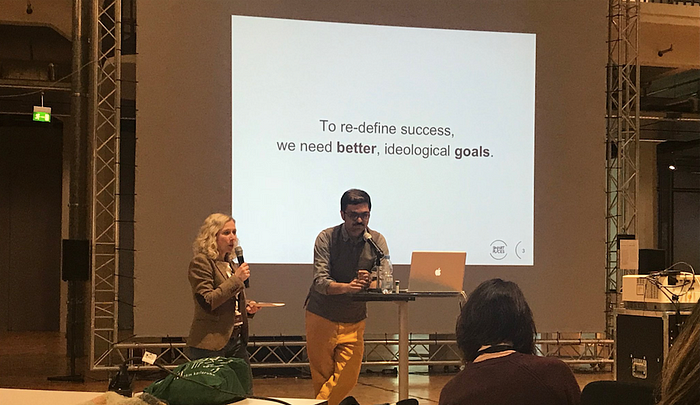Are we too easily seduced by success?
If we follow the rules, we’ll tick all the boxes, just as we have always done. But is this definition of success really an act of self-sabotage? This is a transcript of a talk by Abhay Adhikari and Jasmin Vogel at the smARTplaces Innovation in Culture conference at the ZKM in Karlsruhe, Germany.

[JV] Hello, I’m Jasmin Vogel. Besides being the Marketing Manager at the U, one of my roles is to reach out to new audiences and engage them with our cultural programming onsite and online. This means I work with our local communities — building and managing relationships. It’s based on these experiences that I feel we cannot define success by measuring the same old outcomes. It’s not just a numbers game.
[AA] Hello, I’m Abhay Adhikari. The work that I do is often described with buzzwords like engagement, innovation and storytelling. For the past three years, I’ve lead a project called the Urban Sustainable Development Lab. Although I come from a different field than Jasmin, I too feel that success is too often defined by numbers. Especially when it comes to digital. We need a radical shift in what we consider to be a successful outcome when we work with communities.
“[Cultural institutions] mean different things to different people. I feel we need to become that place which can represent these different perspectives.”
To re-define success, we need better, ideological goals.
[AA] As you’ve guessed by our introductions and the title of this talk, we’re looking for new definitions of success. But when we start to move away from thing we can quantify — visitors, ticket sales and social media reach, the picture gets fuzzy. What else is a measure of success? And why should we care about goals like mediation when there is no straightforward way to measure and report the outcome?
[JV] For a moment, forget what we need to measure and let’s think about our goals. Let me explain why I feel traditional goals aren’t enough. Many of our cultural institutions like the ZKM here in Karlsruhe, are landmarks in the city.This is certainly the case for the U. We’re right in the middle of the city-centre and I know many people, who, the moment they see the U from the train, feel they’ve arrived in Dortmund. We occupy a unique place in people’s imagination. We mean different things to different people. I feel we need to become that place which can represent these different perspectives. This sounds like an ideological goal. But for this to work, we need new benchmarks for success.
[AA] I don’t think having ideological goals is a bad thing. You just have to look at the world around us, communities taking extreme positions — the rise of fake news, trolling, cyberbullying — all because there are some idiots who have mastered the use of social media to spread their brand of ideology. So pretending that ideological goals don’t have impact in our digitally connected age is burying your head in the sand.
For a cultural institution to have an ideological goal, is vital at the moment. Especially a goal like mediating relationships between people and communities who are trapped in their own filter bubbles, both online and offline.
“Let’s be cynical for a moment — there is no shortage of ideological goals. I mean, given a chance, everyone wants to make the world a better place, right?”
But ideological goals have to be more than inspiring words.
[AA] Let’s be cynical for a moment — there is no shortage of ideological goals. I mean, given a chance, everyone wants to make the world a better place, right? But do we go about doing this? Do we just talk the talk and hope and then hope that something happens? Or worse, create disruption, which to me means doing something just because we can. Big bold visions are fine, but only if you’re prepared to put in the time and energy to figure out the small steps that will get you there.
“Of all the qualities I thought someone needs to come to the U — openness, curiosity — I’d never thought bravery would be one of them.”
Good goals put people first.
[JV] I agree. And I’ll add one more point to that. Good goals focus on people. I started this talk by mentioning my goal of mediating the relationship between the U and the city’s different residents. Let me explain the inspiration behind this.
When I first started at the U there was a big divide between us and the local community. It really was a case of Us (to quote — “ivory towers”) versus Them. As a result, I spend a lot of time outside the U, to find the so called hard to reach communities.
Around this time, I met a young women with small children during one of our trips and spent a lot of time convincing her to to attend our next family day. I’m glad to say that she did come, but the first thing she said to me was that it was a real act of bravery on her part.
This really took me by surprise. Of all the qualities I thought someone needs to come to the U — openness, curiosity — I’d never thought bravery would be one of them. But when I looked at my institution from her point of view, I realised, that it really can be a bizarre, alien space. There is a lot of information that needs to be processed by a first time visitor. There are also many hidden rules of behaviour that we take for granted.
My ideological goal: How can I break down these barriers that makes visitors like that woman feel uncomfortable at our place?
“Just as visitors may find our institutions intimidating because they feel they are not privy to the rules of engagement, the same can be said for colleagues in one organisation who just happened to be in different departments.”
Who delivers these goals?
[AA] This is not one person’s job. Nor is it one department’s responsibility. It’s about working together. But this is not an easy task. Just as visitors may find our institutions intimidating because they feel they are not privy to the rules of engagement, the same can be said for colleagues in one organisation who just happened to be in different departments.
We’re so used to working in silos, that often, the most common barrier to any sort of innovation is the inability to reach out and collaborate. The one approach that has worked for me, again and again, is to put myself in someone else’s shoes. It’s finding the middle ground between where I want to be and where my colleagues feel they need to be.
Empathy is vital to this process. Sometimes, it’s also worth creating an intervention that evokes empathy. Let me give you an example. When we setup our innovation lab, we were given the responsibility of developing age friendly digital solutions. This meant, we had to work with older people, young tech developers and the local government, at the same time. I don’t think this had attempted before. So my first step was to find the middle ground, help this community create a new set of rules to engage with each other.
To do this, we organised an unconference. This event has no predefined agenda. People volunteer to give talks and run workshops at the start of the day. A hundred people turned up to our event — civil servants, people in their 70s and a dozen or so developers. A lot of people were nervous. I certainly was. But it was fascinating to see what happens when a group of very different people get together in a neutral space. In my case, they took tentative steps to get to know each other, on their own initiative. People started to ask each other questions. Break down stereotypes and find the most unexpected connections to bond with each other.
One of the most memorable outcomes of this unconference was when a female tech developer from Singapore, who has now become an important member of our lab — said to me after the unconference, I’m glad that not all old, white people are racist.
“Empathy is a superpower we all need. It allows you to anticipate change and negotiation complex expectations.”
You may possess a superpower, but you’re not the hero of this story.
[JV] Empathy is a superpower we all need. It allows you to anticipate change and negotiation complex expectations. If you’re leading an innovative project in your organisation, you do not have to do by yourself or just with your department. Be the author of this innovation story and set the stage for others to be the hero of your story.
The alternative definition of success.
[AA] Success is a process. Have ideological goals. But there cannot be a one-size-fits-all approach. We need more experiments. By this I don’t mean flights of fantasy where anything goes. It’s about taking asking what if questions and then taking small steps.
[JV] Take it simple and be realistic. Be brave, bend the rules just a little. They can take it. Nothing can happen. Collaborate — Find your tribe (like minded people) that will follow the road with you.
Think big, act small, fail fast, learn
—
